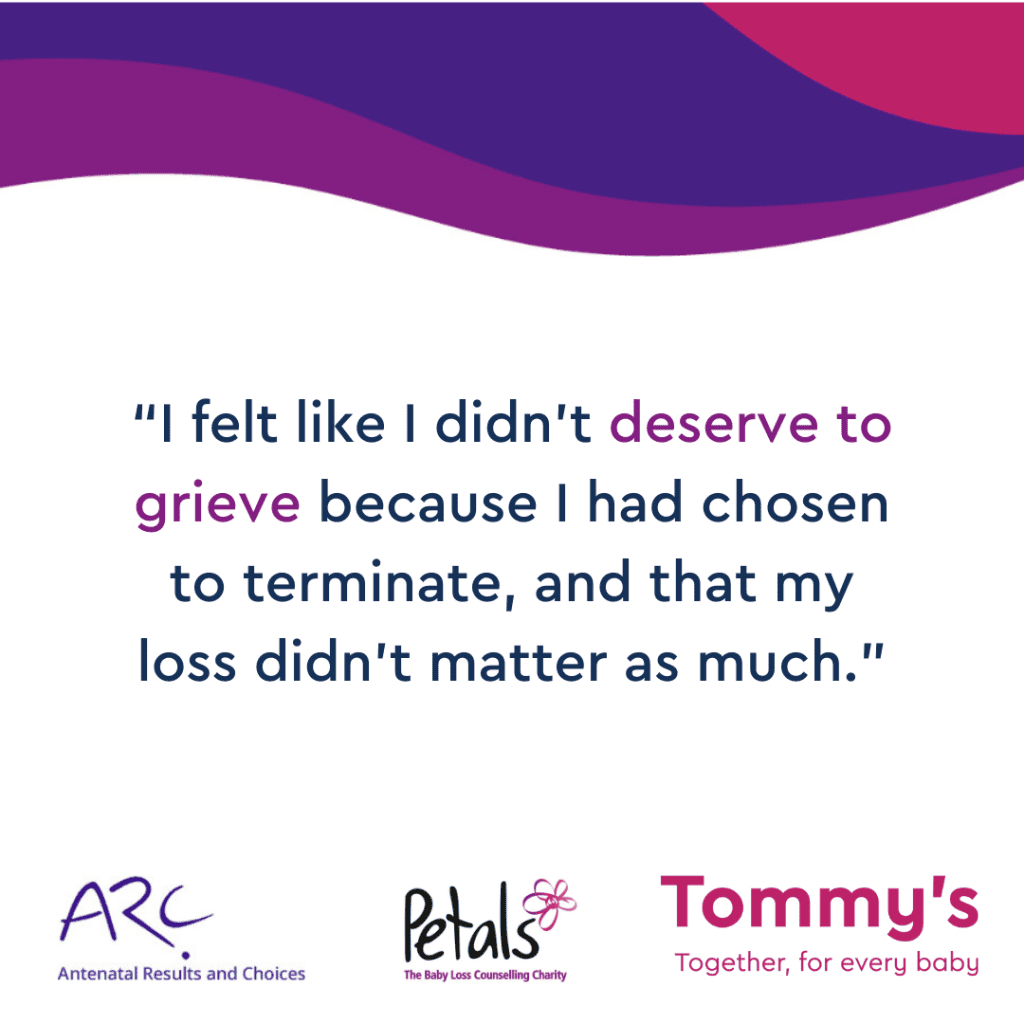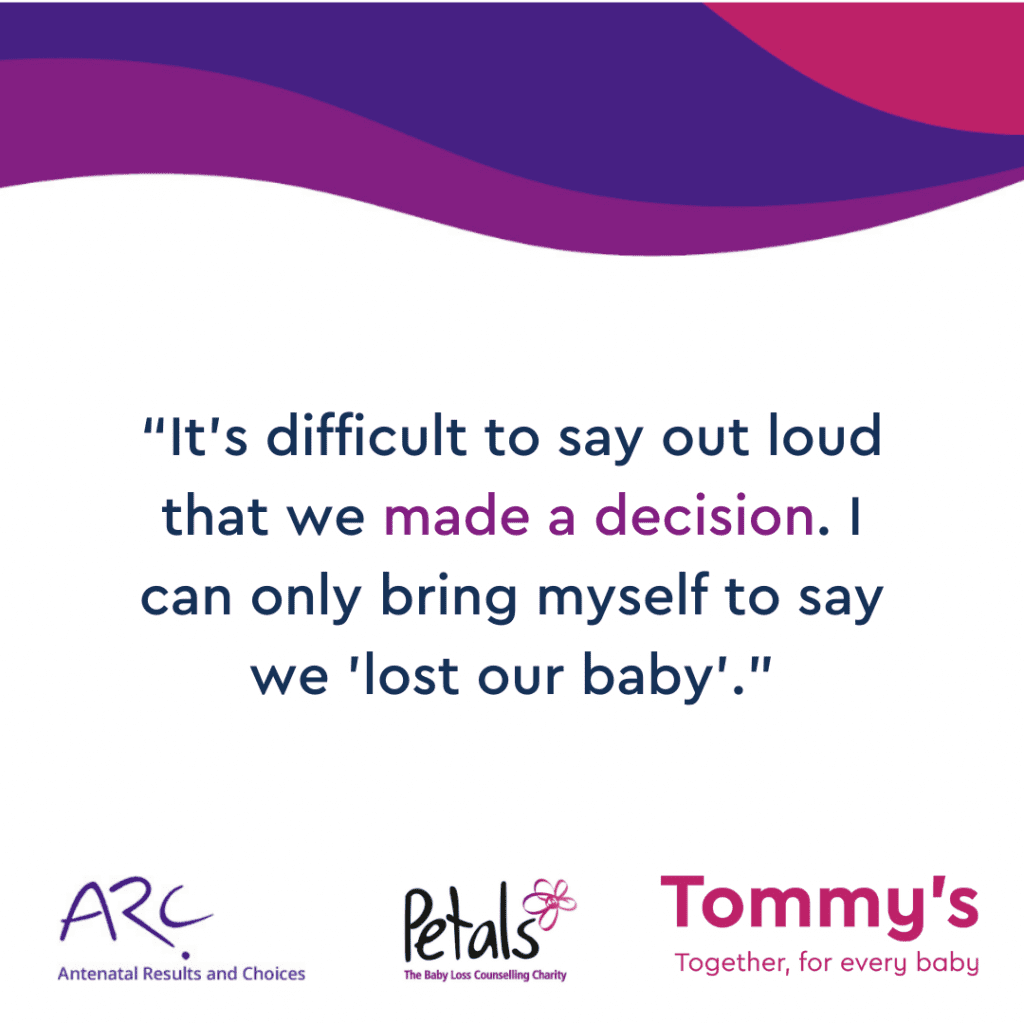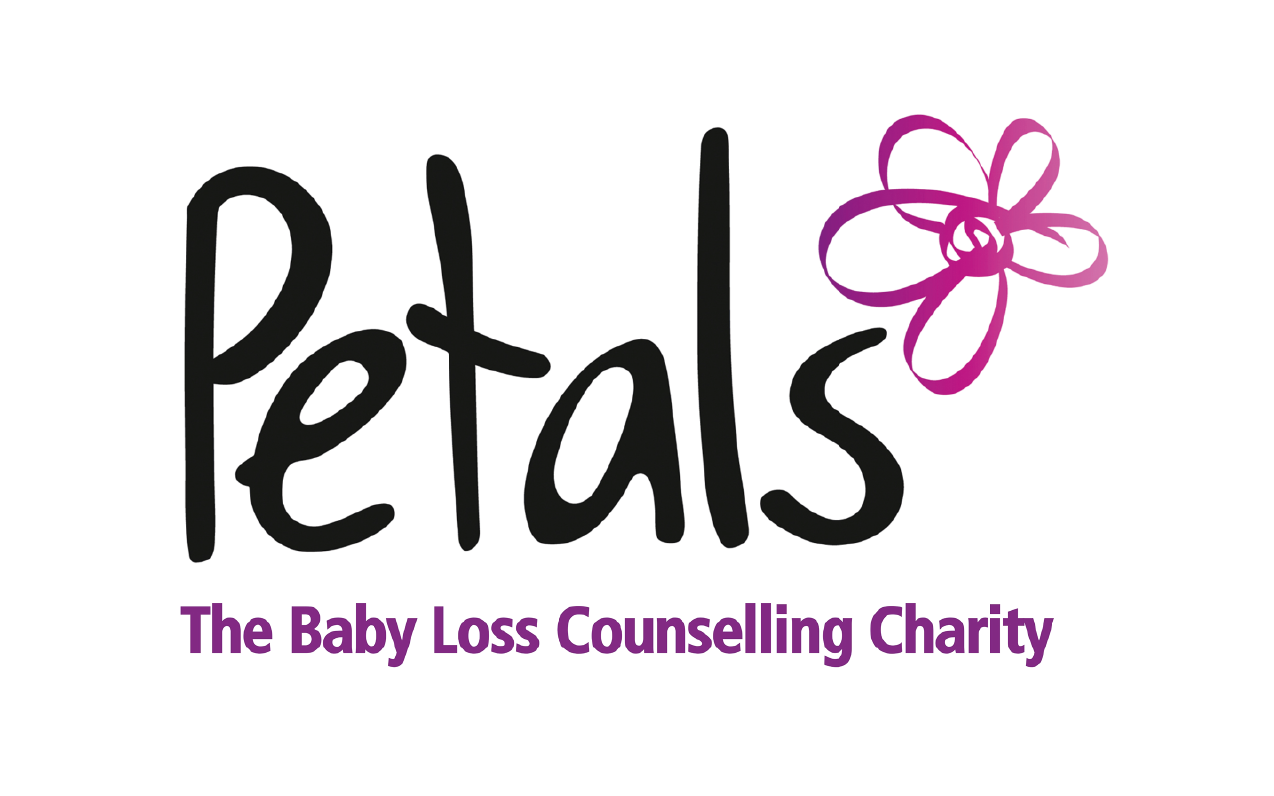
When we partnered with Antenatal Results and Choices (ARC) and Tommy’s, we wanted to make sure families who’d experienced TFMR felt included in our baby loss community. Following last year’s successful campaign, we spoke to families about what’s most important to them and how we can help.
“I felt like I didn’t deserve to grieve because I had chosen to terminate, and that my loss didn’t matter as much.”
We asked people who had experienced Termination For Medical Reasons (TFMR) to tell us more about their experience, to help us guide our ongoing partnership with ARC and Tommy’s. TFMR is used to describe the painful circumstance of ending a wanted pregnancy after a prenatal diagnosis of a condition in the baby or because of health issues affecting the mother.
A huge thank you to the more than 1300 people who took the time to share their experiences, thoughts and feelings with us. It’s vital that the voices of families who’ve had a TFMR are at the centre of everything we do together and shape our way forward.

Here’s a summary of what we learnt:
Understanding
“They wouldn’t understand. I love and wanted my baby.”
The concept of ‘choice’ when terminating a pregnancy for medical reasons does not capture the true complexities of deciding to end a wanted pregnancy, and our respondents felt this is really important for people to understand.
72% felt that TFMR was not treated the same as other types of baby loss, and people who’ve had a TFMR said they don’t always feel they ‘fit’ with other baby loss support groups because of their specific experience.
Together, we want to ensure that families who’ve experienced TFMR feel included in our community. That’s why we’re working to share more TFMR stories on our Your Stories page.
Openness
“It’s difficult to say out loud that we made a decision. I can only bring myself to say we ‘lost our baby’”
54% said they have only been open about their TFMR with ‘some people’. The comments suggested that this was because they feared judgement and other possible reactions, and this influenced their decision about who to tell.
We know that being able to talk about their loss can help families cope with their grief. Petals supports families across the UK with specialist counselling following baby loss and encourages anyone who is struggling to talk about their loss to reach out for support. Private online platforms like the ARC forums, Petals Together, and Tommy’s Baby Loss Support Group are another way for parents to connect and cope, whether they want to share their own thoughts and feelings or simply take comfort in reading those of people with similar experiences.
Information
“The information from ARC was invaluable I’m not sure what I would have done without their support.”
The verbal information people received about their TFMR was difficult to take in at the time, and families often said they were not provided with information in a written format. Those who’d been given information resources produced by ARC found them very helpful and felt more prepared during and after the process.
We found that parents need more practical information about what to expect during and after their procedure – for example, what to bring to hospital, what their delivery involves, and how their body might feel and react afterwards. They also wanted better information about how they can say goodbye to their baby, make memories and take steps to plan for their baby’s funeral or commemoration.
Care
“The hospital I was at were really informative and helpful when we went through our TFMR. I had a traumatic missed miscarriage at the same hospital 3 years before and didn’t feel I was told enough about that. This time I felt everything was dealt with much more empathetically.”
Compassion and sensitivity are really important, because without them, people who’ve had a TFMR can often feel judged – even by the health professionals caring for them during their experience. Delivery of news wasn’t always given sensitively, and distress was caused by the use of medicalised language such as ‘fetus’ and ‘abortion drugs’. There was also a need for staff to review medical notes before appointments to understand each family’s pregnancy journey.
Common words from families who’d had good experiences were: kindness, sensitivity, dignity, compassion, respect, caring and supportive.
Practical steps need to be taken to make sure that people having a TFMR get consistent care during and beyond their pregnancy. Things like having a named contact can make a big difference and were valued by the families we spoke to.
Support
“The midwife who cared for me was full of compassion. I really appreciated her presence and support. I have also had incredible empathy and understanding from my Petals counsellor, who has helped me to grieve more fully.”
Over 40% said that they weren’t offered any bereavement support by their hospital.
While we’re pleased that this isn’t the experience for most of those who responded, it’s disappointing to hear that some families are still unable to access good bereavement support. This is something ARC, Petals and Tommy’s will continue to champion.
The results showed a huge variation in the type of bereavement support offered. Most were put in touch with their local bereavement midwife, whereas others were signposted to a support group (often not specifically for TFMR). Approximately 20% of the families who responded had been able to access some form of counselling, but only 5% said this was specialist, such as the service delivered by Petals. The NHS recently announced the formation of Maternal Mental Health Services across England which we hope will increase access to the specialist psychological support parents need. Petals is currently working with these services to ensure that as many bereaved parents are supported as possible.
Impact
“I have been diagnosed with PTSD. Emotionally, I have found it incredibly difficult, I have often felt deeply guilty and incredibly upset.”
The most notable response about feelings after TFMR was ‘sadness’, together with 80% highlighting the feeling of ‘isolation’, and 87% indicating that they felt feelings of ‘guilt’. A number of our respondents talked about longer-term mental health issues following their loss. Here at Petals we see this on a daily basis, and our counsellors are trained to help parents process these feelings and develop coping strategies so that they can avoid long-term mental health problems.
Life after TFMR can be very difficult, which is why we’re working with ARC and Tommy’s to support families and to keep the conversation going. No one should feel isolated by their loss.
What you’d like to see from our partnership
● Increased awareness and understanding of how common TFMR is, alongside other types of pregnancy and baby loss.
● Better awareness and understanding of the emotional needs of TFMR parents and how those around them can better support them.
● Support for anxiety in another pregnancy, where there is fear of it happening again.
● Sensitive media coverage and real life stories.
What we’re going to do going forward
Together with ARC and Tommy’s, we will continue our partnership to break the silence around TFMR and lift the taboo. We will keep working together to share real life stories across all of our own communications channels, as well as asking others to provide platforms for your experiences and voices, and work together to provide information and ways we can be support those who need us.
The results of our survey were featured in The Guardian this week – you can read the article here:
Follow us on social media (search for @petalscharity on Facebook, Twitter, Instagram, and LinkedIn) to stay up to date as our campaign progresses. If you’d like to share your story on our blog or in the wider media, please email [email protected]


Reading this article as I had a TMFR last year. I’ve found the results really interesting and absolutely true. Extremely disappointed that I read the guardian article and at the bottom, it links to an article about abortion. TMFR is very different from abortion and the two are not the same.